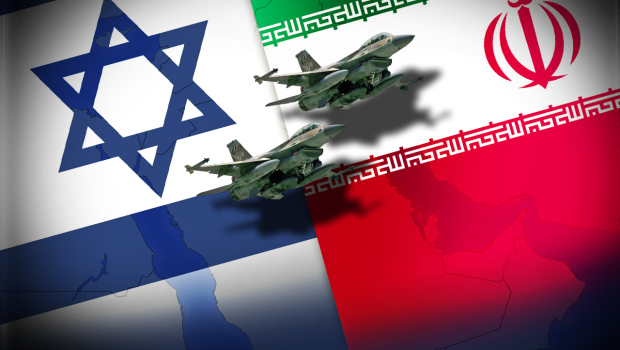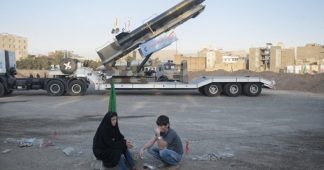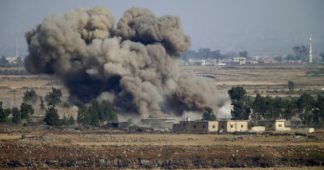By Jean Shaoul
Apr. 9, 2021
In a deliberate and provocative escalation of its offensive against Iran, Israel mined the cargo ship MV Saviz, owned by the state-linked Islamic Republic of Iran Shipping Lines, in the Red Sea on Tuesday morning.
It signals Israel’s determination to continue its naval offensive against Iran, despite potential reprisals from Tehran and the danger of an escalation into all-out war, as the major powers meet with Iran in Vienna to discuss a return to the 2015 nuclear accord, known as the Joint Comprehensive Plan of Action (JCPOA), unilaterally abandoned by former President Trump.
The New York Times cited an unnamed American official as saying that Israel had informed the US that its navy had attacked the vessel near the Djibouti coast, claiming the attack was in retaliation for earlier Iranian strikes on Israeli vessels.
According to Iranian Foreign Ministry spokesman Saeed Khatibzadeh, Tuesday’s explosion, caused by “limpet mines attached to the hull of the ship, resulted in only minor damage.” He added that the Saviz was a “non-military ship” helping to “provide security along shipping lines and combat pirates” in the Red Sea and the Bab el-Mandeb strait, a crucial chokepoint in international shipping.
US and Saudi analysts claim the vessel, present in the Red Sea since late 2016, is a “mothership” for the Iranian Revolutionary Guards Corps’ flotilla of ships in the Red Sea and that uniformed men and a class of small boats used by the Guards have been photographed on board the ship’s deck. It is believed to play a crucial role in Tehran’s efforts to evade sanctions by transferring oil shipments midsea to non-Iranian flagged vessels.
The Israeli attack is part of its long-running, covert offensive by its naval, air, security and intelligence forces against Iran.
Last month, the Wall Street Journal, citing US officials, revealed for the first time that Israel had attacked at least a dozen ships bound for Syria in the past two and a half years, most of which were carrying Iranian oil, while some were carrying weaponry to Tehran’s allies, including Hezbollah, in Syria. The leaks to the Journal, like those earlier this week to the Times, are presumed to have come from officials opposed to Israel’s efforts to torpedo talks aimed at restoring the nuclear accord with Iran and isolating China.
A report in Ha’aretz puts the number of Iranian tankers sabotaged at around 20, with an estimated loss to Al Quds, Hezbollah and the Shi’ite militias of $500,000 over two and a half years. These attacks, which damaged but deliberately avoided sinking the vessels, were for the dual purpose of disrupting Iran’s supply of oil to Syria and choking off the revenue stream that paid the Shi’ite militias and Hezbollah supporting the Syrian regime forces. The newspaper also confirmed earlier Syrian and Iranian claims about an explosion on an Iranian tanker in the Red Sea in late 2019.
Such military attacks on civilian vessels in international waters are flagrant breaches of international law, potentially exposing Israel to international court actions, although the Journal was silent on that issue. By escalating the dangers to shipping, they could also lead to an increase in insurance premiums for maritime commerce in the region.
The attack on MV Savid is the second attack on an Iranian vessel since the WSJ report last month, when Iran accused Israel of damaging another ship sailing in the Mediterranean Sea.
Following the Journal’s revelations about Israel’s attacks, Tehran could no longer turn a blind eye, instead retaliating in a tit-for-tat response, with reports of Iranian missile attacks on two Israeli-owned cargo ships, one in the Arabian Sea and another in the Mediterranean.
Israel’s clandestine attacks on Iranian ships opened a new front in its operations that had largely been carried out by land and air. Tel Aviv has admitted to carrying out hundreds of strikes on Iranian-linked targets, including Lebanon’s Hezbollah, in neighbouring Syria since the start of the US-led proxy war to topple the regime of Syrian President Bashar al-Assad, as part of its broader campaign to isolate Iran. It has also carried out a series of attacks inside Iran, including an explosion in July that destroyed an advanced centrifuge assembly plant at the Natanz nuclear facility and the assassination in November of Mohsen Fakhrizadeh, a leading Iranian scientist who set up the country’s nuclear programme two decades ago.
These attacks were carried out in conjunction with the Trump administration’s campaign of “maximum pressure” against Iran, launched after Washington unilaterally abrogated the JCPOA in 2018. The ever-tightening economic sanctions, particularly on oil, Iran’s main export industry, and secondary sanctions—tantamount to a state of war—have devastated Iran’s economy, while condemning millions of Iranians to hunger and disease, choking off vital medicines and medical supplies in the midst of the raging COVID-19 pandemic.
Iran’s Minister of Foreign Affairs Mohammad Javad Zarif said earlier this year that the Trump administration had imposed, reimposed or relabeled some 1,600 sanctions on Iran, causing $1 trillion worth of direct and indirect economic damage to the country. The sanctions regime has also had wide-ranging regional repercussions, with Lebanon—whose banks served as the conduit for channeling money to Lebanese and Syrian citizens, as well as Hezbollah—one of the major victims.
Israel’s Prime Minister Benjamin Netanyahu has insisted that there should be no return to the “dangerous” 2015 nuclear accord, telling his Likud party on Tuesday, “In parallel we must continue to fend off Iranian belligerence in our region. And this threat is no theoretical matter. I’m not uttering it rhetorically. We must take action in the face of the fanatical regime in Iran, which simply threatens to wipe us off the face of the earth.”
While Netanyahu is determined to sabotage any attempt by the Biden administration to rejoin the JCPOA and lift sanctions against Iran, the New York Times cited an Israeli official as saying that the attacks were part of its broader strategy to force Tehran into agreeing to tougher and longer curbs on its nuclear ambitions along with restrictions on its ballistic missile program and its support for regional militias.
Netanyahu was speaking as Iran and the US were holding indirect talks in Vienna on ways to revive the deal that included the European powers, China and Russia. Both Tehran and Washington described the talks as “constructive.” Tehran has insisted that Iran would return to full compliance with the agreement as soon as Washington verifiably lifted the complex web of sanctions imposed on Iran since 2018 that includes many different categories, some of which are unrelated to the nuclear deal.
The Israeli leader’s increasing belligerence against Iran is conditioned by Monday’s opening of the evidentiary sessions for his long-delayed trial on multiple charges of bribery, corruption and breach of trust, for which if convicted he faces years in jail. Refusing to resign while he defends himself in court, he has called his trial an “abuse of power” by the state prosecutor’s office, saying, “This is what a coup attempt looks like.” After leaving Monday’s session, he accused the prosecution of having illegally tampered with evidence, conducting a “witchhunt” against him and attempting to carry out a judicial “coup.”
In the last four years, Netanyahu has fought four inconclusive elections amid rising unemployment poverty and inequality, in a bid to assemble a coalition government strong enough to pass laws granting him immunity from prosecution and increased powers that would effectively neuter the judicial system, prompting his critics to warn of an impending constitutional crisis. While President Reuven Rivlin has called on Netanyahu, whose Likud party is the largest party in the Knesset, to try to form a government, it is widely believed that he will be unable to do so, precipitating yet another election.
Under such circumstances, Netanyahu calculates that fomenting a war with Iran may serve to divert social, economic and political tensions outwards and enable him to maintain his grip on power, even though such a war could engulf the entire region and, indeed, the entire world.
Published at www.wsws.org











